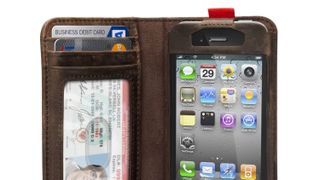Save time and money: shop smarter with your iPad or iPhone
Save yourself time and money
Finally, mySupermarket Mobile (Free, iPhone and iPod touch) allows UK shoppers to see which supermarkets are running deals on your weekly regulars. Scan a barcode or check your saved shopping list to find out where you'll save the most.
Mobile payments
The idea that we should be able to pay for goods and services in shops without having to carry money has been around for decades, but we're still stuck with cash and plastic. The Passbook app in iOS is a pointer to where Apple might be headed, though. It lets you store tickets, boarding passes, loyalty cards and vouchers to display when you need them, so you no longer have to carry physical copies.
So far support is limited, especially outside the US, but Apple hopes developers and merchants will take full advantage of it in the future.
Passbook is currently not really a payment system, though. Will we ever use our iPhone or iPod touch to hand over our cash? Apple seems to think so. It has already introduced a system in its own stores, called EasyPay, which allows you to scan the barcode of some products in-store, then log in with your Apple ID, pay with the stored credit card and collect your purchase before leaving the store. So far, however, it's restricted to Apple's own retail stores.

Square, co-founded by Twitter's Jack Dorsey, has a card reader that plugs into the audio jack of a mobile device to accept payments, and Square Wallet allows customers to make payments using a smartphone.
SagePay is trialling a similar solution in the UK that would let shops accept chip and pin payments on mobile devices like smartphones, and Barclays PingIt (Free, iPhone and iPod touch) allows you to send money to anyone using a mobile phone number. These systems, however, still require you to queue at a checkout in order to make a payment in a shop. If mobile payments are to work efficiently, they need to eliminate that step.
Much has been made in recent years of a technology called near field communication (NFC) - a short-range wireless system that lets customers use smartphones to make payments at NFC-enabled tills.
Get daily insight, inspiration and deals in your inbox
Get the hottest deals available in your inbox plus news, reviews, opinion, analysis and more from the TechRadar team.
Google Wallet, for example, lets users store credit card details and then use those through a specially-created pre-paid MasterCard to pay for goods. There's no global standard for NFC, however, which makes rolling out universal payment systems tricky. Also, in order for it to work, shops have to install NFC-enabled payment points.
That's expensive and there is little incentive for them to do so. There appears to be no great demand from consumers, perhaps because the extra convenience of swiping a phone at a reader rather than a credit card is minimal. And the single most popular smartphone on the planet, the iPhone, doesn't support NFC.
If not NFC, then what? Cloud-based payments could use Bluetooth 4 to link to a store's payment system. You would scan the item you want with your phone, tap 'Buy' and be connected. You'd still need some way to transfer money, of course.
That could be where Apple comes in. It already holds millions of credit card details in iTunes, and allowing third parties to deduct payments from your iTunes account shouldn't be too difficult. Indeed, Apple has applied for a patent - called iWallet - for just such a system.
